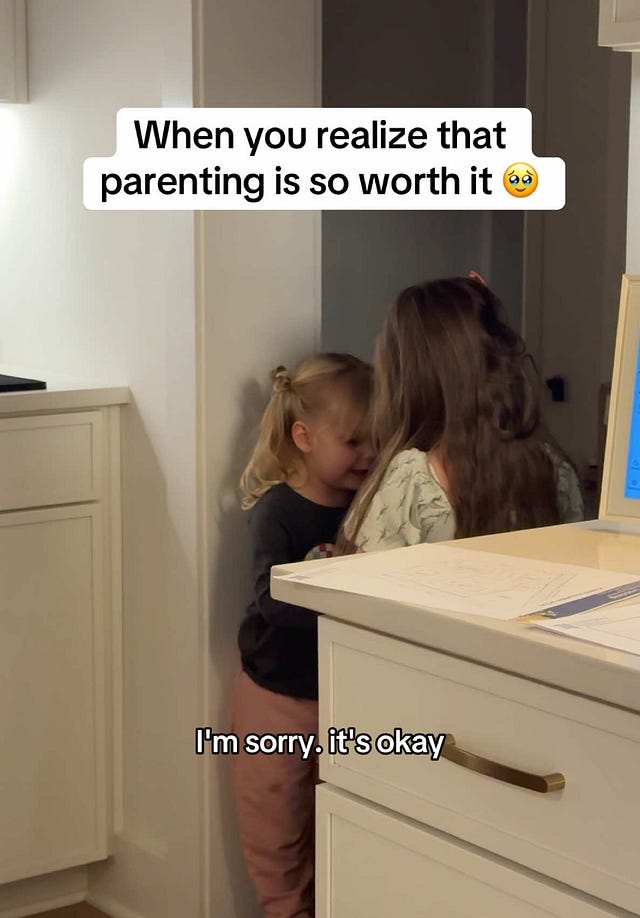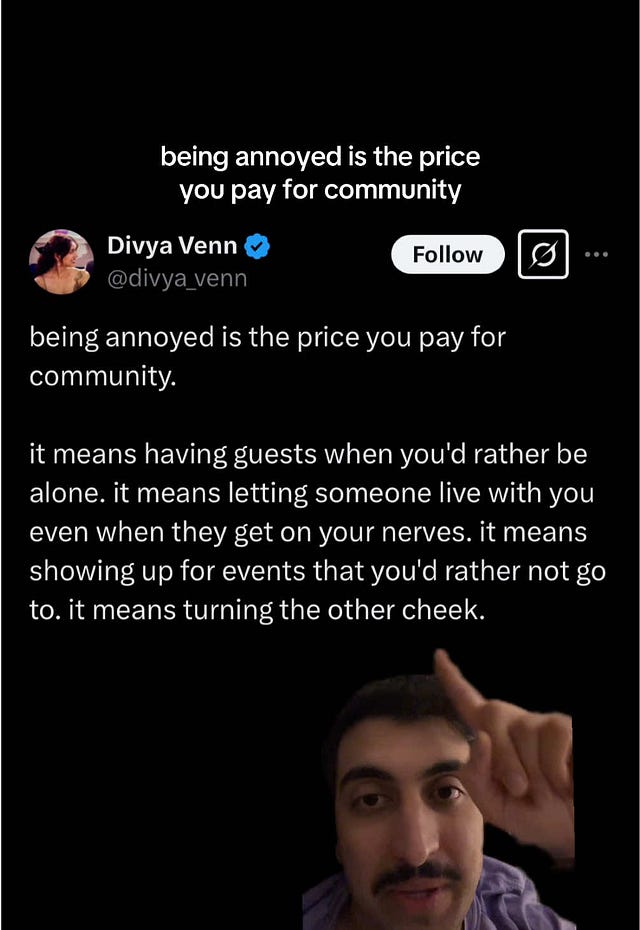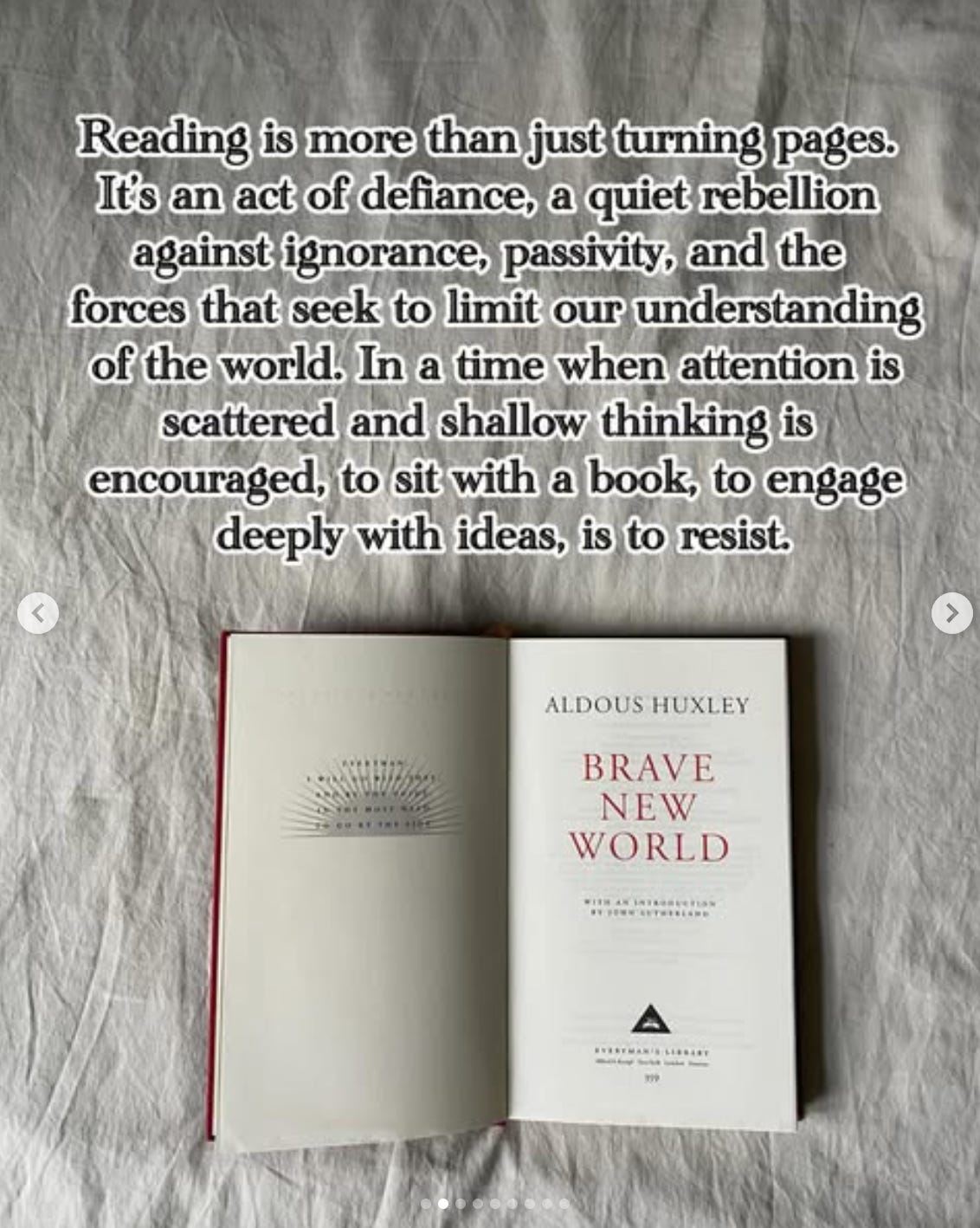What got me thinking this week (3.6.25)
Is the gender pay gap ever going away? Building a community means being annoyed sometimes. Selling your Tesla is a powerful act of protest. And more!
Hi everyone! Another Thursday, another round-up of podcast episodes, articles, and other media that have my brain buzzing. As always, please send me any recs of stuff you think others should know about! And comment if you take a look at/listen to any of the below.
from reading 📚
I think most of us hope that we are broadly headed in the direction of progress, even if a specific year or decade (🥴) sets us back. I mean, we have to believe this because truly what else are we left with?! Well…according to the Harvard Business Review, even despite any increases we’ve seen in women leadership, attention given to sexual harassment in the workplace (at least at the cultural conversation level), and equity pay adjustments that you hear more and more about, gender equity at work isn’t inevitable. In 2023, for the first time in 20 years, the gender wage gap WIDENED. They offer some interesting data points there, specifically around how younger women get stuck in entry level at far higher rates than men, and also that ageism impacts women of all ages, not just older women. It’s..not great.
~~~~
One of the most interesting topics to me is community: how to find it, why it's disappeared over the last decade/s, what’s involved in making and sustaining it etc. A conversation I’ve seen quite a bit about this is around the parts that aren’t so fluffy, cozy, easy: namely, the annoyance, anger, frustration, and messiness that emerges when you are actually in relationships with people. I want community—but am I prepared to put the work in? from the Guardian gets at some of this (see pull quote below)
“A lot of people say they want to build community, but their No 1, often only, goal is to extract time, attention and money,” he warns. “There’s a constant calculation of value exchange going on, and at some point that’s going to go south.”
While you might believe you are already part of a community – for instance, in the area where you live – “if you literally don’t know the names of your neighbours … you’re just strangers in proximity”.
For Vogl, a community is defined not by common interests or physical space, but as “a group of people who share mutual concern for one another”. It’s the difference between someone you feel you could call on for help in the event of a 3am plumbing emergency, versus “someone you technically ate pizza with” once
I saw a TikTok this week (see below) from my friend Zaid that says something similar. Zaid talks about a tweet that reads “being annoyed is the price you pay for community.” I think a lot of people chafe at that (I mean, just look at the comments on Zaid’s TikTok and you’ll see..) but I think it just IS. Like any relationship, we are just random people choosing to share space and time and invest in each other. Of course we all bring our own issues, traumas, annoyances, personalities, preferences and the journey is in figuring out how to do that dance together. The alternative is being alone and I know some people say they want that, but I definitely don’t (at least not always LOL I am naturally more introverted and do love my alone time but it’s the mix! We need the balance!)
~~~~
Sometimes, when I get annoyed with a certain influencer or want to understand what ‘the group’ largely thinks of this or that person, I’ll mosey on over to the snark subreddits, pages where people talk a lot of shit about influencers and celebrities. If the person is famous (read: hated) enough, you will usually be able to find people discussing the exact topic about the exact person you’re looking for. Yes it can be mean and dog-piling; they’re also so interesting to analyze. The Cut did just that in their article Meet the Redditors Who Spend Hours Snarking on Influencers. What type of person actively goes online to write mean things about celebrities? They highlight a few different people. Because I’ll read it (for sure) but wouldn’t necessarily think to start the thread myself. But many people do! And they’re all different kinds of people: people who are jealous, cynical, who believe they’re just *sharing information* they have access to etc etc they span the gambit! I found this whole thing wildly interesting.
from listening 🎧
The R-word is back. But why? is a great episode from the podcast It’s Been a Minute. It’s an interview with Imani Barbarin (@crutchesandspice on social media) who is an excellent speaker and thinker around race, disability, and communications. This short conversation starts to get at why language matters and also why ableism is one of the last forms of discrimination that continues to pervade without shame.
~~~~
In the latest episode of the podcast Tech Won’t Save us, entitled Protesting Tesla Can Hurt Elon w/ Ed Niedermeyer, they dig into the truth of Elon’s supposed “good at business” image (which only the select few believe at this point…) based on how he has structured and is running Tesla. There are a lot of similarities between how he ran Twitter to the ground, how he’s slowly but surely killing Tesla and now, how he is managing (if one can even use that word….) DOGE. If you want more of this, I recently read the book Character Limit—which I cannot recommend enough—that starkly lays out the chaos of Elon’s purchase of Twitter.
from anywhere else 📱
This Substack note (and honestly all of the comments in the thread-click the image to open it in Substack)

~~~~
And then on the totally other end of the book spectrum: Why Reading Matters More Than Ever, an Instagram thread from @lit.by.adam. I love (and feel deeply, as a reader) each of the slides & I recommend reading through them all but let me put a few here:
and then on a different note, this TikTok of two sisters communicating clearly and with such love to one another as they de-escalate a situation. It’s such a beautiful example of gentle parenting and reminder that maybe the kids will be alright (in large part thanks to their Millennial parents who are healing themselves HELLO!!)

 Tiktok failed to load.
Tiktok failed to load.Enable 3rd party cookies or use another browser
Thanks for reading! This is the first post of the month, which is free to all of my subscribers! If you want these recommendations weekly, consider switching to paid at the button here.
Also, I’d love your feedback (in the comments or via email). Do you like the diversity of topics? Anything you want more or less of?
Thanks!
Miriam







I'll "third" on the community bit! I've been thinking about this a lot lately too. The book club idea seems doubly beneficial - reading already challenges us intellectually and expands our perspectives, but doing that in community creates this wonderful multiplier effect. We get to process ideas together, hear different viewpoints, and build meaningful connections at the same time. Count me in if you start that Bowling Alone book club, Miriam! It does seem fitting to read a book about community decline... in community.
The topic of 'we want community, but are we prepared to put in the work'! Ugh-I have so many thoughts, feelings and deep desire to talk about this. And it makes me want to prioritize reading Bowling Alone by Robert Putnam.
Something I've been thinking about how to have a community where there is a place for diversity of thought too.
I recently went to a book club put on by a local bookstore and the book we were discussing was Anne Frank They Diary of a Young Girl. There were about 30 ppl there, mostly women, 6 men. And one gentleman accounted for about 30% of the discussion. He shared about the tension he felt between reading about Anne's inner thoughts about the boy she liked versus the killings happening in the street below and how trivial he felt her views were. Then he asked if this could really be considered a "Holocaust Book" and mentioned a few other memoirs by survivors who wrote about their time at the camps. I loved hearing folks respond to his comments (educators talking about how important this book is to be able to discuss a horrific topic with younger kids). And while his questions and thoughts stirred something inside me - I left feeling grateful to having been exposed to his kind of thought process. And here it is almost 3 weeks later and I'm still thinking about it.
My favorite lines in Elle Hunt's article in the Guardian were:
"The word “community” has warm, fuzzy connotations. But a siloed, individualistic culture also makes it harder to establish and maintain community" - And isn't that the point of a "black and white" / "zero sum" stance, to make it hard to come together?
"Boundaries are important, Vogl says, not necessarily for keeping people out, but “to make the inside safe”." - What feels hard about this is having a boundary without being called "woke".
"For Vogl, a community is defined not by common interests or physical space, but as “a group of people who share mutual concern for one another”" - I love this definition of community. If feels right.